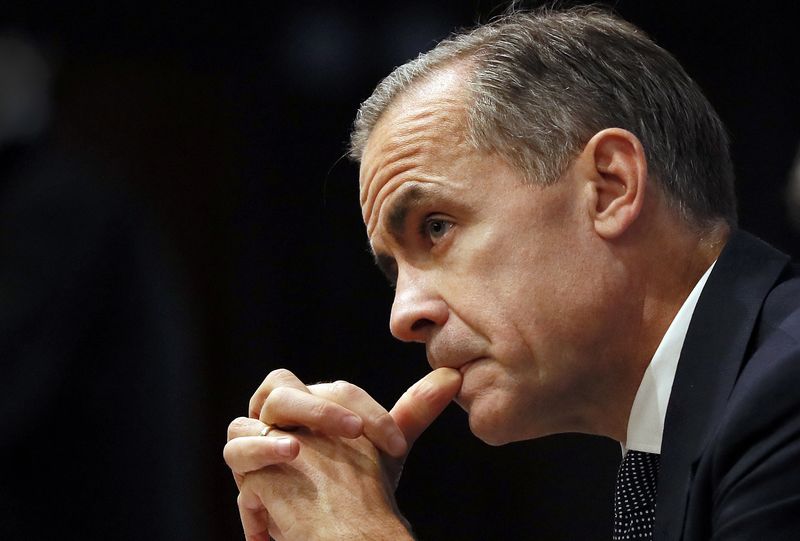By William Schomberg and David Milliken
LONDON (Reuters) - The Bank of England made its latest sharp increase to forecasts for British economic growth in 2017 on Thursday, but appeared in no rush to raise interest rates, warning of "twists and turns" on the road out of the European Union.
There were signs of a partial split as some of the BoE's nine rate-setters "moved a little closer" to their limits for tolerating an expected overshoot of inflation above their 2 percent goal.
But the general message from the BoE was that it remained comfortable with its record low rates even as the pound's slide since June's Brexit vote pushes prices up quickly.
In response, the pound fell and British government 10-year bond yields headed for their biggest one-day decline in two months, suggesting investors were pushing back their bets on when the BoE might raise rates.
The Monetary Policy Committee voted unanimously to keep rates on hold at a record low of 0.25 percent and to leave its other stimulus programs unchanged.
Governor Mark Carney said that just because the central bank had raised its growth forecasts, it did not mean that the vote to leave the European Union would be painless.
"The Brexit journey is really just beginning. While the direction of travel is clear, there will be twists and turns along the way," he told a news conference.
Significantly, the BoE also said it now believed the unemployment rate could fall to 4.5 percent - down from a previous estimate of 5 percent and below the current rate of 4.8 percent - before it starts to push up inflation.
That could help the central bank to keep rates low for longer despite it announcing the second big increase in three months to its forecast for economic growth in 2017.
After Thursday's announcement, financial markets were pricing in a roughly 36 percent chance of a rate hike by the BoE this year, down from 50 percent last week, according to HSBC, while economists said it would probably not happen until mid-2019.
"The MPC may decide to start its tightening cycle only after the UK is safely out of the EU, despite a short- to medium-term peak in inflation above the MPC target of 2 percent," Yael Selfin, an economist with KPMG said.
Economists with RBC Capital Markets said they still expected the next move by the BoE to be a rate cut next year as the Brexit pressure on inflation hurt spending and growth.
Carney and his fellow policymakers were wrong-footed by the resilience of Britain's economy last year following the referendum decision in June to take the country out of the EU.
Britain's growth in 2016 was faster than in any other Group of Seven big rich economy, confounding the BoE's pre-referendum warnings of a swift Brexit hit to the economy.
"The thing that we missed is the strength of consumer spending and consumer confidence associated with that," Carney told reporters when asked about last year's forecasting failure.
STRONG GROWTH VIEW
The BoE said it now expected economic growth of 2.0 percent this year, higher than the forecasts of all but one of 50 economists polled by Reuters last month and up a lot from its previous forecast of 1.4 percent.
The new 2017 outlook towered above the forecast of 0.8 percent growth made by the bank in the weeks after the Brexit vote, when the economy seemed to be heading for a recession and the BoE cut interest rates to a record low of 0.25 percent.
Since then, Britain's consumers have carried on spending and finance minister Philip Hammond has relaxed the country's austerity drive.
Growth forecasts for 2018 and 2019 were raised by a moderate 0.1 percentage points in each year, and the BoE said it still expected rising inflation to cause household living standards to start stagnating at the end of this year.
On inflation, Carney said he expected price growth to hit the bank's 2 percent target this month but the BoE also said it now expected inflation in two years' time, a key yard-stick, to be slightly lower than it said in November.
The BoE said it eased the inflation outlook in part because of a mini-recovery in the value of sterling and the recent increase in market bets on higher interest rates.
The outlook for Britain's economy remains highly uncertain for political reasons too, related to Brexit and the policies of new U.S. President Donald Trump. Carney said the scope for central banks to dominate the global economy was diminishing, with interest rates already so low.
"In many respects, we're coming to the last seconds of central bankers' 15 minutes of fame, to use the Warhol line, which is a good thing," he said.

U.S. artist Andy Warhol once said that in the future everyone would be world-famous for 15 minutes.